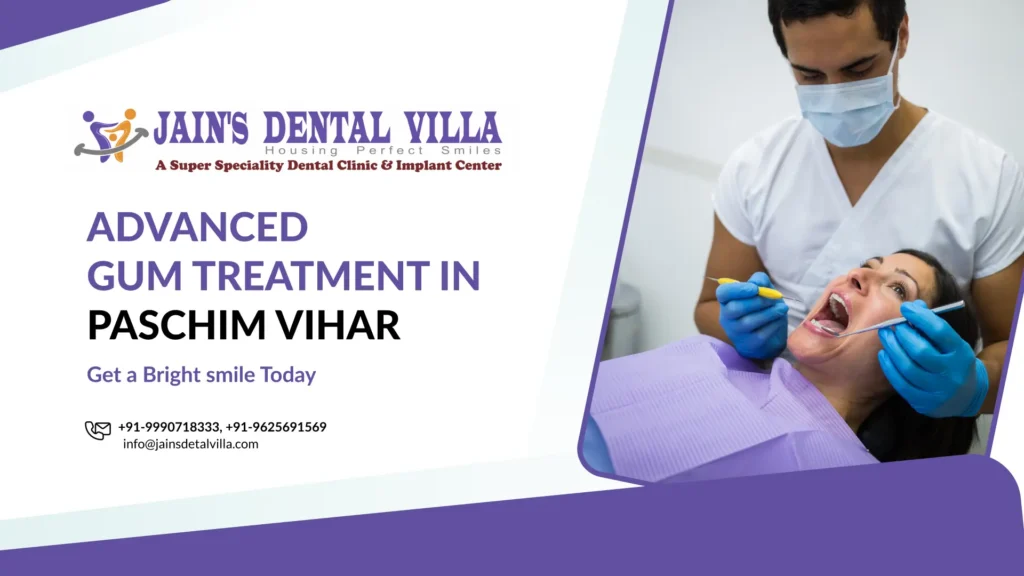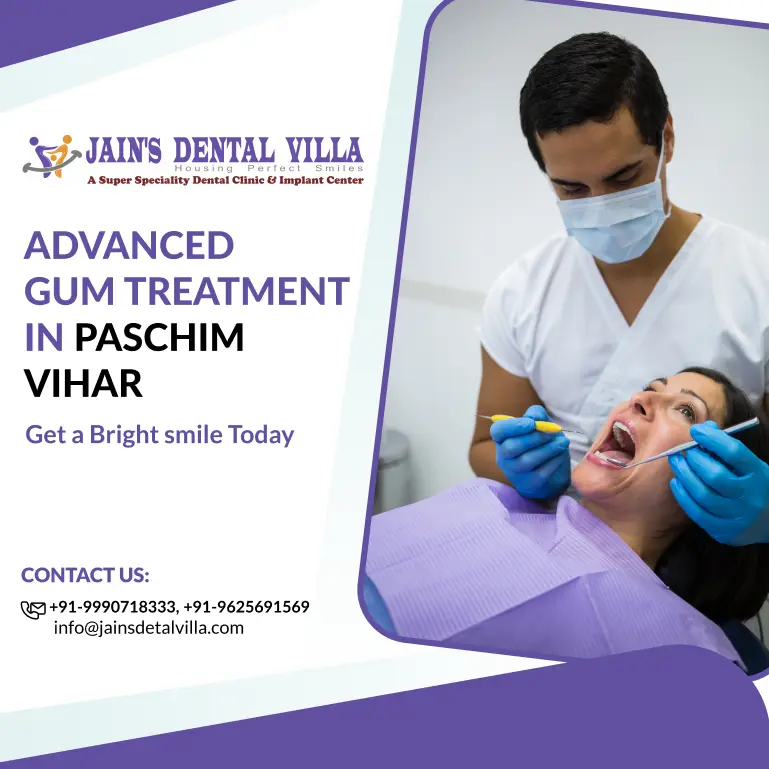What is gum disease?
Infection of the pink tissue that surrounds the teeth is called gum disease or periodontal disease. The 2 main stages of gum disease are gingivitis and periodontitis. Gingivitis is the initial stage of gum disease. Permanent damage of oral tissues does not occur and it is fairly mild. When gingivitis is not treated for a long time, it can lead to periodontitis. Gums and underlying bone can be damaged permanently in this stage. Older individuals, people with poor oral hygiene habits, smokers, and pregnant women are more prone to gum disease. Advanced gum treatment in Paschim Vihar can be availed at Jain’s Dental Villa.

Symptoms of Gum Disease
Symptoms of Gingivitis
1. Continuous bad breath.
2. Puffy gums that are red and swollen.
3. Brushing and flossing leading to bleeding of gums.
4. Teeth may appear longer than normal due to mild gum recession.
Symptoms of Periodontitis
1. Loss of teeth.
2. Pain during chewing.
3. Dentures and bridges not fitting correctly.
4. Acute gum recession.
Types of Advanced Gum Treatment in Paschim Vihar
The extent of gum disease determines the type of treatment required for the same. Changes to your at-home oral hygiene routine is sufficient in mild cases. Extensive care is necessary in acute cases of periodontitis.
Scaling and Root Planing: Scaling and root planing is also called deep cleaning. The process of removing plaque and tartar from teeth and gums is called scaling. The areas around and beneath the gumline are spots that cannot be reached through regular dental cleaning. Scaling is used to remove bacteria in these regions.
Root planing is the process by which the roots of your teeth are smoothened. This enables gums to reattach themselves to teeth as they heal. This prevents the buildup of plaque. When we notice symptoms such as swelling, bleeding, and inflammation, we prevent it from progressing and causing permanent damage to your oral health. Bacteria that get accumulated around and beneath the gumline are removed with the help of scaling and root planing.
Special dental instruments are used to scrape away plaque and tartar during scaling. The region under the gumline where bacteria deposits are formed will be specifically targeted. Root planing begins after scaling is complete. Parts of the teeth beneath the gumline are smoothened down so that gums attach to your teeth more easily. Future buildup of bacteria is prevented thereby enabling a quicker healing process. The risk of developing gum disease in the future is greatly reduced.
Post care tips after scaling and root planing: It is important to brush your teeth twice a day using a soft-bristled toothbrush and a fluoridated toothpaste. Gentle circular motions must be employed. In order to prevent irritation and to wash away food particles, rinse your mouth with salt water after eating. It is important to floss every day. Spicy, acidic and hot foods must be avoided. A soft diet is recommended for 48 hours after the treatment. Finally, intense physical activity should be avoided after the procedure.
Antibiotic Treatment: Scaling and root planing is often coupled with antibiotic therapy. Deep cleaning removes most of the bacteria but the residual bacteria can be removed with the help of antibiotics. The pockets between the teeth and gums are the region in which the antibiotic is placed. Pocket size is gradually reduced as the medication is released. This process takes a few weeks.
Laser Periodontal Treatment: Diseased gum tissue is removed with the help of a laser. Proper healing is ensured by getting rid of the infected areas. As compared to treatment procedures performed with a scalpel, those performed with a laser are faster and more precise. Bacteria also get killed when exposed to the laser.
Also read:- Advanced Gum Treatment in Ashok Vihar
Advantages of Advanced Gum Treatment
1. Better Oral Health: Treatment for periodontal disease focuses on eradicating germs and reducing inflammation to address the underlying cause of the problem. This results in healthier gums, which lowers the chance of tooth loss and stops the oral structures from further deteriorating.
2. Improved General Health: Studies have connected gum disease to a number of systemic diseases, including diabetes, heart disease, and respiratory disorders. In addition to improving oral health, treating gum disease may lower the chance of acquiring some more serious health issues.
3. Stopping Progression: The best way to stop gum disease from getting worse is to act quickly. By receiving treatment, the illness can be prevented from progressing to more advanced stages, where it will be more difficult to repair the damage.
4. Preserving Teeth: Gum disease can weaken the teeth’s supporting framework. People can preserve their natural teeth and prevent the need for extractions or other invasive dental treatments by seeking treatment to safeguard these structures.
5. Improved Comfort: The symptoms of gum disease like bleeding and sensitivity cause pain and discomfort. Treatment not only deals with the primary cause but also addresses these symptoms, improving general comfort.
6. Increased Confidence: Gum disease’s visual effects can have an impact on a person’s sense of self-worth. In addition to restoring dental health, treatment improves appearance of your smile, which increases self-esteem and facilitates better social interactions.
7. Long-Term Savings: Compared to treating severe stages, early gum disease treatment is typically less intrusive and more economical. People can avoid potential future dental problems and costs by investing in treatment early on.
Disadvantages of Advanced Gum Treatment
1. Exposure of tooth structure may result in change in shape of the gums. This can alter a person’s smile.
2. Advanced gum treatment involves the removal of healthy gum tissue in order to remove the unhealthy tissue.
3. The cost of treatment can be expensive in some cases.
4. Painkillers may be required after advanced gum treatment.
5. Advanced gum treatment is an invasive procedure and could involve significant bleeding.
6. It could result in disruption of your schedule and time off work.
7. Soft food diet is recommended for several weeks after treatment.
Why Choose Jain’s Dental Villa for Advanced Gum Treatment in Paschim Vihar
Zen Dental uses the newest technologies to improve patient comfort and procedure results. Our periodontal therapies emphasize preventive and long-term health rather than just treating current problems. Gum health is maintained in large part by routine examinations and informed advice.
Among the top dental clinics in New Delhi, Jain’s Dental Villa stands out for its individualized treatment programs and dedication to gentle, efficient procedures. Every patient receives support and advice that are specific to their needs, guaranteeing the greatest outcomes.
You are choosing a partner in your dental health journey when you choose Jain’s Dental Villa. Our website, jainsdentalvilla.com, makes it simple for anyone who wants to make an appointment or learn more about our periodontal treatments. Our committed staff is ready to help you attain a healthy smile.
Frequently Asked Questions
Brushing very forcefully with a hard-bristled tooth toothbrush can result in damage to the gum tissue. This makes the gums more prone to disease.
Mouthwash is a useful tool to maintain good oral health and hygiene. It helps kill bacteria and freshens the mouth. But it cannot be relied on exclusively in order to maintain good oral health. Brushing and flossing are very important. It is also necessary to visit a periodontist regularly. Jain’s Dental provides advanced gum treatment in Paschim Vihar.
This depends on the stage of gum disease. It is important to treat gum disease as early as possible to prevent loss of teeth.
There are no specific home remedies to cure gum disease. But it can be prevented from spreading by maintaining a good level of oral hygiene. You must brush twice a day using a fluoride toothpaste. Flossing must also be done every day and an antibacterial mouthwash should be used. The above methods will help prevent food particles from getting stuck between your teeth. It is also important to have a balanced diet. Food items containing high sugar must be avoided. Consumption of fruits and vegetables will help reduce the chance of plaque buildup. Smoking and chewing tobacco cause gum disease and should be avoided.
Swelling of gums and change in their colour to red or purple are initial signs of gum disease. Plaque starts getting accumulated in the teeth. Secretion of pus near the gumline and loss of teeth are advanced stages of gum disease.
It is important to brush twice a day with a fluoride toothpaste, floss every day and use an antibacterial mouthwash to maintain good oral health and hygiene.
